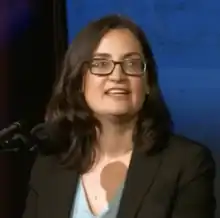Catherine Crump
Catherine Crump (born 1978) is an American law professor and civil liberties expert focused on the effects of digital surveillance technology on privacy and free speech.[1] She is the Director of the Samuelson Law, Technology and Public Policy Clinic, Co-Director of Berkeley Center for Law and Technology, and a Clinical Professor of Law at the UC Berkeley School of Law. Crump's expertise on digital data collection and the law is regularly featured in the media.[2][3] In 2023, Crump served as a senior policy advisor for criminal justice for the White House Domestic Policy Council.[4]
Catherine Crump | |
|---|---|
 Catherine Crump appearing as a panelist in an Intelligence Squared U.S. Foundation debate cosponsored by the National Constitution Center | |
| Born | 1978 (age 44–45) |
| Nationality | American |
| Education | Stanford University (BA) Stanford Law School (JD) |
| Occupation(s) | Lawyer, law school professor |
| Known for | Advocacy of privacy rights |
Career
Crump served as a staff attorney for the American Civil Liberties Union and is currently a law professor and director of the Samuelson Law, Technology and Public Policy Clinic at the University of California, Berkeley.[5][6] The Berkeley clinic gives Berkeley Law students hands-on experience at the intersection of technology and law such as a project on the California criminal justice system's use of electronic surveillance bracelets on juveniles.[7]
Throughout her career, Crump has been a staunch and consistent advocate for privacy. She has criticized the FAA for focusing exclusively on safety issues regarding drone aircraft and not addressing possible privacy issues such as whether the craft could be misused for spying and data gathering.[8] She criticized the use of cameras to read license plates and subsequently build databases on the "movements of millions of Americans over months or even years".[9][10] She has argued that Congress should prohibit the misuse by law enforcement officers of cell phone and GPS technology to collect private information on innocent people without first getting a warrant.[11] She criticized the policy of border patrol agents to detain travelers and examine the contents of their laptop computers and cell phones "without suspecting the traveler of wrongdoing".[12][13] She believes government should target surveillance based on "those suspected of wrongdoing" and refrain from building giant databases of the movements of innocent citizens.[14]
References
- "Catherine Crump CSPAN Appearances". C-SPAN People. C-SPAN. Retrieved 16 July 2022.
- "Abortion is illegal for millions. Will Big Tech help prosecute it?". The Washington Post. Retrieved 16 July 2022.
- Borba, Andria (June 28, 2022). "Cellphone data collection, tracking apps can help states prosecute women seeking abortions". CBS. Retrieved 16 July 2022.
- Cohen, Andrew (2023-01-11). "Two Berkeley Law professors start tech-related White House appointments". Berkeley Law. Retrieved 2023-09-13.
- "Drones Moving From War Zones To The Home Front". NPR. April 17, 2012. Retrieved May 31, 2015.
Catherine Crump, staff attorney with the American Civil Liberties Union's Speech, Privacy and Technology Project
- Fung, Brian (July 30, 2014). "Think the Supreme Court protected your cellphone from warrantless searches? Think again". The Washington Post. Retrieved May 31, 2015.
"It truly is a suspicion-less search policy," said Catherine Crump
- Holland, Jake (August 7, 2022). "From Harvard to Berkeley, Clinics Train Next-Gen Tech Lawyers". Bloomberg Law. Retrieved Aug 7, 2022.
- Hennigan, W. J. (November 27, 2011). "Idea of civilians using drone aircraft may soon fly with FAA: The Federal Aviation Administration plans to propose new rules for the use of small drones in January, a first step toward clearing the way for police departments, farmers and others to employ the technology". Los Angeles Times. Archived from the original on April 12, 2015. Retrieved May 31, 2015.
"FAA … should also make sure Americans' privacy is maintained," said Catherine Crump, an American Civil Liberties Union staff attorney.
- "Government drops plan to collect license plate tracking info". USA Today. Associated Press. February 19, 2014. Retrieved May 31, 2015.
Catherine Crump, an ACLU lawyer, … pleased to hear that the department has canceled the contract proposal
- Timberg, Craig (July 17, 2013). "License-plate cameras track millions of Americans". The Washington Post. Retrieved May 31, 2015.
cheap, powerful cameras capable of reading license plates has allowed police to build databases on the movements of millions of Americans over months or even years
- Heininger, Claire (April 23, 2009). "ACLU says Chris Christie authorized warrantless cellphone tracking". nj.com. Retrieved May 31, 2015.
Crump... federal laws on electronic surveillance do not directly address cell phone and GPS technology
- Bray, Chad (September 7, 2010). "ACLU Sues Homeland Security Over Search Policies". Wall Street Journal. Retrieved May 31, 2015.
The U.S. Department of Homeland Security has been sued over its policies that allegedly authorize the search and seizure of laptops, cellphones and other electronic devices
- Nakashima, Ellen (September 7, 2010). "New lawsuit to challenge laptop searches at U.S. border". The Washington Post. Retrieved May 31, 2015.
Catherine Crump said this case may be more likely to succeed.
- Calamur, Krishnadev (December 4, 2013). "NSA Collecting 5B Cellphone Locations A Day, News Report Says". NPR. Retrieved August 2, 2016.
Crump said: The government should be targeting its surveillance at those suspected of wrongdoing, not assembling massive associational databases.